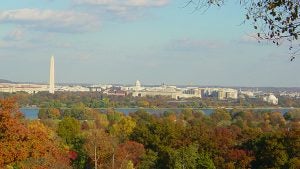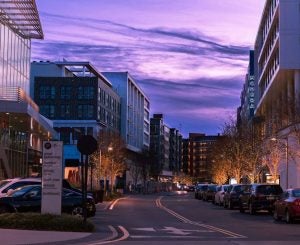Student Life

UVA School of Medicine is a friendly, welcoming learning community where students learn not only the art and science of practicing medicine, but also develop personally. Students can find a wide range of activities to match their interests, including research opportunities, hands-on clinical experiences, and student organizations. And when it’s time to relax, the Charlottesville area offers numerous festivals and events, easy access to outdoor activities, great restaurants, and robust arts and crafts communities. Our students feel at home here.
VMED Strength – A Student led initiative
UVA medical students working with the UVA SOM Alumni Association proposed and built a student run gym specifically for UVA medical students use. The gym offers UVA medical students a wide variety of classes, equipment and peer support.
Learning Communities at UVA School of Medicine
Our innovative learning communities approach provides longitudinal-support, mentoring and curricular structures that help students succeed. These four learning communities, called “Colleges,” enable a social context for learning, facilitating more consistent oversight of clinical performance and professional development.
The City of Charlottesville is located in Central Virginia, approximately 100 miles southwest of Washington, D.C. and 70 miles northwest of Richmond, Virginia. Charlottesville serves as the economic, recreational, and educational center of a multi-county region in Central Virginia. It includes many of the advantages of a much larger community, including theater, dance, and musical performance, art exhibits, and opportunities for swimming, tennis, skiing, hiking, canoeing, and other sports. Nearby attractions include Thomas Jefferson’s home at Monticello, James Madison’s home Montpelier, and James Monroe’s home Ash Lawn.
The City of Charlottesville, locally known as “C’ville”, is consistently ranked one of the best places to live in the United States.
Behind the Scenes at Charlottesville TomTom Festival
5 Things to do in Charlottesville
Please also refer to the Graduate Guide, for more information on these and other aspects of life in Charlottesville.
You couldn’t ask for a better place to live and study than in the Washington metro area. You’ll enjoy the area’s many museums, historical landmarks, art galleries, a variety of dining, professional sports venues, entertainment and shopping. Public transportation is inexpensive and convenient via the area’s vast Metro rail system, so getting around is easy.

From city to suburbs, all is within reach and the varied living options allow for students to choose where they will grow and benefit the most. There is a robust offering of housing within walking distance of the Inova Fairfax Medical Campus and a very short distance away from the newly developed Mosaic district that maintains all one needs for the staples of life plus the opportunities to dine and be entertained.

Student activities at the School of Medicine include a broad range of clubs, courses, and activities both relating to the curriculum and extracurricular in nature. For more information about SOM activities, see the SOM Student Clubs & Activities website. In addition, School of Medicine students have access to all University facilities, clubs, and creative or athletic activities and events. Learn more about the major types of activities included, below:
-
Athletics & Outdoor Activities
Athletics & Outdoor Activities include a variety of charity, single, seasonal, and team-based opportunities. These include the Medical Football League (MFL), soccer, triathlons, the SOM Wilderness Club and other activities such as those shown above in the student life slideshow of images. Graduate students at the University of Virginia are welcomed into intramural and other recreational sports (IM-REC Sports) activities of the wider university as well.
-
Creative Arts/Activities
Creative Arts/Activities also cover a broad range of activities for medical students as well as all UVA students and the wider Charlottesville community. Medical students form groups such as the musical acapella Arrhythmics; perform acting, dancing, and musical acts for the annual talent shows; have creative works published in the student-run Veritas creative magazine and are also welcome to participate in the wider creative activities of the University of Virginia (UVA-Arts).
-
Clinical Skills Development Opportunities
Clinical Skills Development Opportunities workshops, gatherings, and other opportunities range from surgery observations to suture clinics; obstetrics to wilderness medicine courses; a multitude of shadowing opportunities across the UVA Medical Center to medical interest groups.
-
Volunteerism and Service Activities
Volunteerism and Service Activities include charity events, fund drives, and other contributions to local, state, national, and international groups. Many medical students volunteer at the Charlottesville Free Clinic, at the Remote Area Medicine (RAM) Clinic held annually in southwest Virginia, or participate in Service, Humanity, Action, Responsibility, Education (SHARE).
The Mulholland Society – Student Government
The University of Virginia has a long-standing tradition of student self-governance which at the medical school is the Mulholland Society. This organization includes all medical students, and promotes the interests and concerns of the student body.
The Mulholland Society also educates and informs students of national and regional events in the medical field and serves as an outlet for the academic, social, and athletic interests of medical students. Members of the Mulholland Society are elected to represent the School of Medicine on University-wide committees such as the Honor and Judiciary Committees and the Student Council.
The Mulholland Society serves as the coherent student voice. We endeavor to promote the various interests and concerns of all medical students to the faculty and staff of the Health System.
Furthermore, we seek to provide an outlet for academic, social, athletic and personal interests. We meet regularly, and our meetings are open to all students.
For additional information on Student Clubs, and to buy School of Medicine (SOM) Merchandise, visit the links below:
More information about The Student Clubs.
More information about The SOM Merchandise.
University of Virginia Honor Code
The University of Virginia Honor Code is at once an injunction and an aspiration. The injunction is simple: students pledge never to lie, cheat, or steal, and accept that the consequence for breaking this pledge is permanent dismissal from the University. It is for its aspirational quality, however, that the Honor Code is so cherished: in leading lives of honor, students have continuously renewed that unique spirit of compassion and interconnectedness that has come to be called the Community of Trust.
